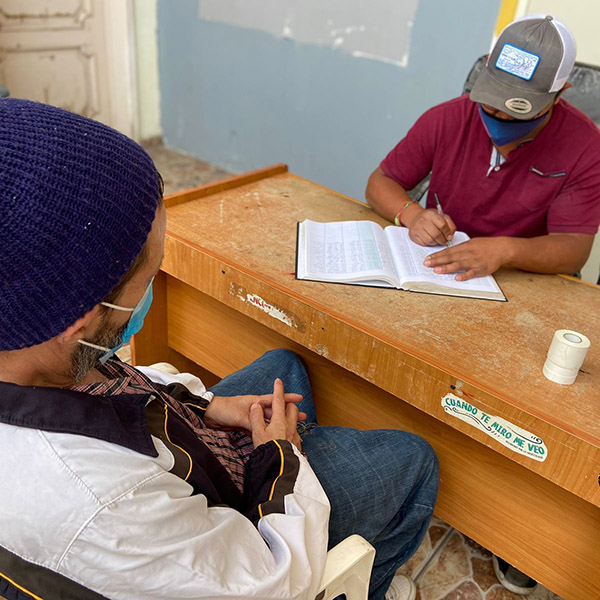Stories of Change

Alexis (right) meets with a guest at Abba House. The sticker on the desk says "cuando te miro me veo" which means "when I look at you, I see myself."
“When you migrate, you know that there are many risks along the way.”
Three years ago, Alexis Márquez* migrated from Honduras to the United States. On the way, he had an accident and lost both feet. He was detained and deported to Honduras. In a new attempt to improve his life, he found what he now considers his home: the Abba Shelter in Celaya, Mexico.
At 28 years old, Alexis has already got used to living with nostalgia and feeling the lack of his loved ones: “When you live far away, you always miss your family, customs, the land, because we bring our country in our blood, we cannot deny it.” However, he adds that he does not miss his life in Honduras, unemployed and without opportunities.
“When you migrate, you know that there are many risks along the way,” he says. “You come with fear and with courage, to move on, to progress a little. You go hand in hand with God, asking that you can reach any destination.” And so he did: In 2019, Alexis left for the U.S. without documentation. He suffered an accident and lost both feet; later, he was arrested.
“It was difficult being in prison, with a disability and in the middle of a pandemic. I was psychologically ill, at high risk of getting sick, in a wheelchair.” The confinement was frustrating: “your world falls apart, everything closes down.” On January 6, 2021, he was deported to Honduras.
This young man was forced to continue living in “another prison” at home in his country. Due to the constant threats in his town, he could not even go out to buy a soda. Moreover, Alexis lived in a mountainous area, with no mobility options for someone in a wheelchair. So then, even with fear and doubts, he decided to leave again; this time, to Mexico, where he had already lived years ago, seasonally, in Guanajuato, San Luis, Aguascalientes, and Zacatecas.
Alexis arrived at the Abba Shelter, a CWS partner in Celaya, Mexico. Each year, the shelter welcomes from 8 to 10,000 migrants, mostly from Central America. It offers accommodation, food, nutrition, health services, medicines, psychosocial and spiritual support, legal and human rights advice, and works in advocacy on public policies and education. Abba is one of the 22 shelters in the national migration network for migrants transiting Mexico.
“They help us finish elementary and high school studies; there are painting courses and music. I’m in guitar lessons,” says Alexis. He added that sometimes he also likes to paint. In addition to receiving psychological help and legal advice to receive a residence permit, the greatest gift that Abba gave this young man was prostheses. Alexis realized his dream to walk again.
Now, he works as a volunteer at the shelter; he thinks it is the best way to thank him for all they have done for him. “I am in charge of receiving people who come looking for support, I welcome them, and for safety, I check that they do not bring knives, weapons, or that they are under the influence of alcohol,” he explained.
Alexis already has the two doses of the vaccine against COVID-19 and is preparing to take the test of the last year of high school; it’s his last step in obtaining a diploma. He is also waiting for the response to his humanitarian visa application. After that, the next on the list will be to apply for a work visa.
Today, Alexis leads a simple life; he enjoys helping his colleagues, and then he attends music and handcraft classes at the shelter. He enjoys going out to eat his favorite dishes, like beans with rice and plantain slices or rotisserie chicken and tacos with cream. He plans to get a house of his own and start a family. “You have to keep trying hard, regardless of the obstacle you have along the way because I have a physical disability, but as the saying goes: ‘la discapacidad no es una incapacidad’ [disability is not an inability].”
*The name has been changed to protect his identity.
Read here the interview with the director of the Abba Hostel, Ignacio Martínez.
